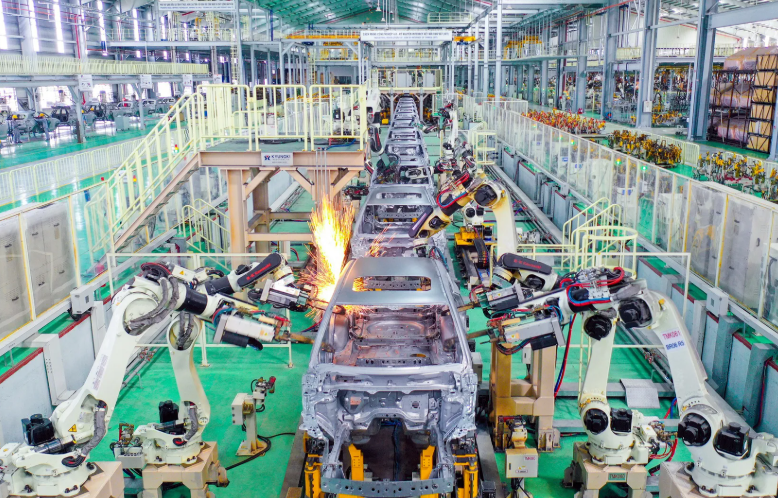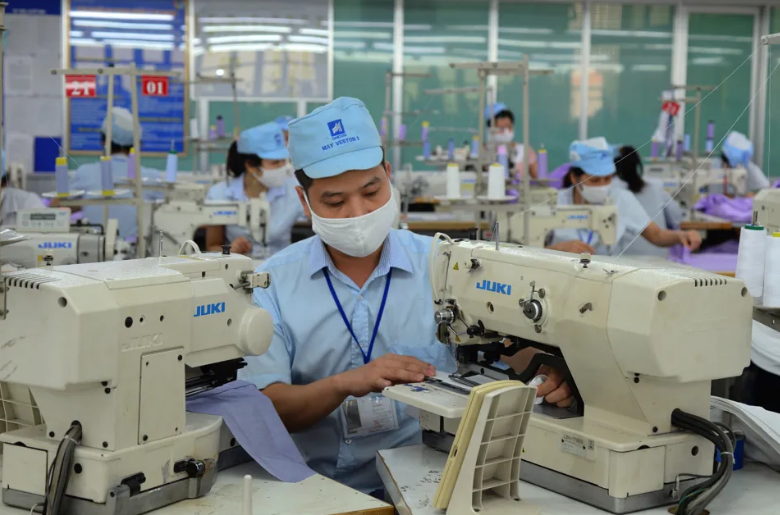Private sector seen as key driver of Vietnam's economy
The Government would continue to ensure the rights of the private sector to business freedom, property rights, fair competition, and contract enforcement.
THE HANOI TIMES — The private sector is considered the main engine of the economy, a leading force in the development of science, technology, and innovation, according to the Politburo's Resolution 68 issued on May 4 concerning the development of the private economy.

The robotic welding line at the THACO Mazda factory. Photo: THACO
The resolution stated that the private sector is the key propeller of the national economy.
It emphasizes that the private sector, along with the state and collective economy, plays a central role in building an independent, self-reliant, and resilient economy while integrating deeply into the global economy.
The Politburo affirms that developing a fast, sustainable, efficient, and high-quality private economy is a central, urgent task with long-term strategic significance to harness all potential and strengths.
The Politburo also insists on breaking down prejudices against the private economy and accurately assessing its important role in national development. At the same time, the government must encourage entrepreneurship and innovation, and facilitate businesses.
Entrepreneurs must be guaranteed full rights to property, business freedom, and fair competition with other economic sectors for business opportunities and resources such as capital, land, technology, labor, data, and other legal resources.
The government's role is to create a business environment that is transparent, stable, secure, enforceable, low-cost, and in line with international standards.
Vietnam will focus on training and developing entrepreneurs who are ethical, cultured, resilient, intelligent, creative, and committed to progress. Entrepreneurs will be honored and encouraged to grow by embodying a spirit of patriotism, national pride, legal compliance, and social responsibility.
The resolution outlines eight key tasks and solutions. The first of them is to build a unified consensus of the political system on the position and role of the private economy. The state should support the growth of the private sector without interfering in production and business activities contrary to market principles.
The resolution also focuses on improving the regulatory framework to create an open, transparent, and low-cost business environment. Administrative procedures will be streamlined through digitization, automation, and the application of artificial intelligence and big data. The authorities aim to reduce the processing time for administrative procedures and compliance costs by at least 30% in 2025.
Specifically, the revised regulations will ensure that administrative measures are prioritized in addressing violations related to economic civil matters, allowing companies and entrepreneurs to proactively correct mistakes and damages. "Where application of the law could lead to criminal prosecution or failure to prosecute a crime, criminal prosecution will not be applied," the resolution said.
In cases where prosecution is warranted, priority will be given to economic recovery measures before other legal action is considered. There will be no retroactive application of laws that disadvantage businesses.
In cases where the evidence is insufficient or unclear, investigating authorities must conclude investigations quickly so as not to affect the reputation and normal business operations of companies. The presumption of innocence must be maintained during investigations and trials.

Production at Garment 10 Company.
The resolution called for the rapid development of large and medium-sized enterprises and private economic conglomerates that are regionally and globally competitive.
It also encourages the private sector participation in major national projects, such as high-speed railways, urban railways, high-tech industries, energy infrastructure, green transportation, and national defense.
Small businesses, micro-enterprises, and household businesses will receive substantial and effective support. The government will review legal structures and reduce discrepancies to encourage family businesses to register as companies. The lump sum tax for household businesses will be phased out by 2026.
Currently, with over 940,000 companies and more than five million home-based businesses, the private sector contributes about 50% of GDP, over 30% of government revenues, and 82% of total employment.
Vietnam aims to have two million companies by 2030, which would mean 20 companies per 1,000 people. At least 20 large enterprises are expected to participate in the global value chain.
In addition, the private sector is expected to grow at an average rate of 10%-12% annually, faster than the national economy. It will contribute about 55%-58% of GDP, 35%-40% of state budget revenues, and provide employment for about 85% of the labor force, with labor productivity growing by 8.5%-9.5% per year.
The resolution also sets a target for the private sector to achieve technology, innovation, and digital transformation capabilities that rank among the top three in ASEAN and the top five in Asia by 2030.
By 2045, the private sector will play an active role in global production and supply chains. Vietnamese companies will be highly competitive regionally and internationally, with at least three million companies contributing over 60% of GDP.












